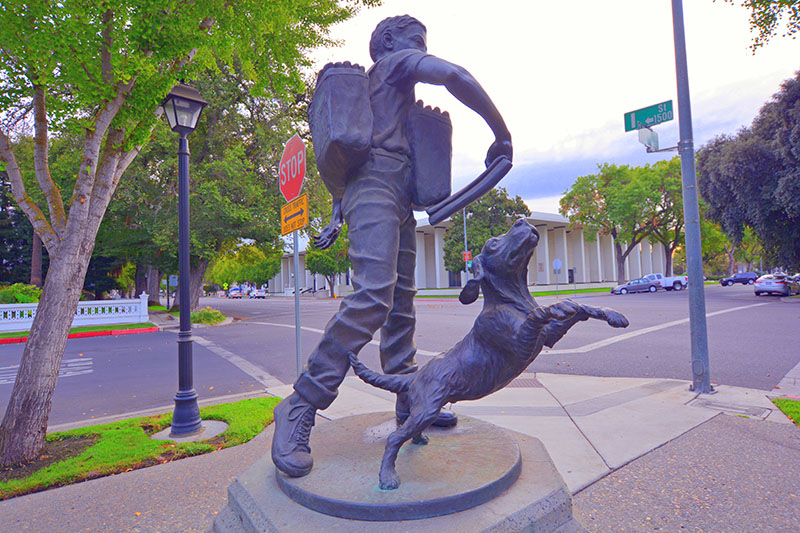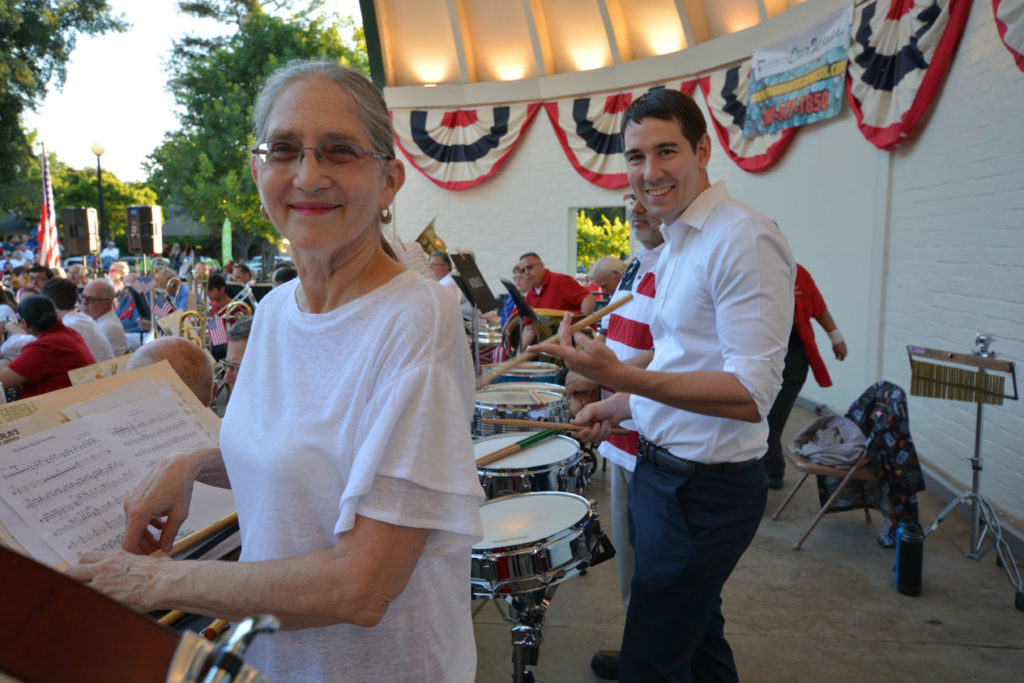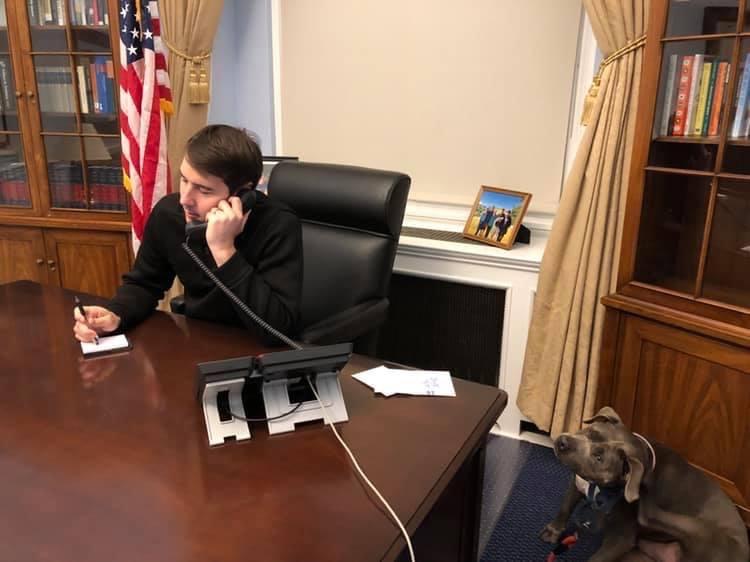You know that being an American is more than a matter of where your parents came from. It is a belief that all men are created free and equal and that everyone deserves an even break. Harry S. Truman
Though he may soon become yet another casualty of new technology, the paperboy is one of our most revered icons. At least two presidents, Harry Truman and Dwight Eisenhower, are among the large group of famous people who began their careers delivering the news.
Before the job was taken more and more by adults driving cars, most paperboys walked their routes or rode bicycles. Turlock’s Josh Harder was a rarity. After he learned how to balance his bulging sack of newspapers, he zoomed along the city’s streets and sidewalks atop a pair of rollerblades. He got good enough on the skates to land every paper on a customer’s porch. Even then, speed and efficiency were part of the young entrepreneur’s keys to success.
Harder gave up his paper route when he enrolled in Modesto High School’s AP program for college-bound students. The commute from Turlock didn’t allow time enough for a paper route.

At Modesto High, the erstwhile paperboy earned scholarships to Stanford, where he majored in Economics and Political Science. He then went on to achieve Master’s Degrees at Harvard, in Business Administration and Public Policy.
After college, he went into finance. By the age of thirty, Josh Harder had achieved more success in business than many people do in a lifetime. Finances and the future offered a limitless horizon.
2016 changed everything. Stunned and alarmed by the ascendance of Donald Trump to the White House, Harder vowed to do everything he could to reverse what he saw as a dangerous erosion of America’s democratic values. He worried especially about health care for his younger brother, who was born with severe medical problems.
Some would say his next decision was unhinged; Josh Harder decided to run for congress in the district of his birthplace, where Republican incumbent Jeff Denham had beaten back every challenge during an eight-year incumbency. He’d even beaten Michael Eggman, a popular and charismatic Democrat whose sister was an icon of the local Democratic Party.
Eggman initially had decided not to run in 2018, but then jumped into the primary late, after polling showed him the strongest candidate in a field that included Harder, TJ Cox, Virginia Madueno and Modesto’s Sue Zwahlen. Soon after Eggman entered the primary, Cox switched his campaign to Congressional District 21, where he defeated Republican incumbent David Valadao.
Every Democrat in that primary field had better name recognition than Josh Harder. Seasoned observers determined early on that he was too young, too nerdy, and too little known to compete. The one thing he did have was money, but many dismissed it as frivolous “Bay Area” money.
Those who looked more closely saw that Harder had dozens upon dozens of donations from all over the country, including his district. The obvious question was how had such a young man managed to tap so many donors for what appeared to be a doomed quest for congress.
One answer was that Josh Harder had inspired people by his values and convinced them by example that he could win and do good.
Visitors to his campaign office found it staffed with brainy young people who seemed to subsist on coffee, donuts, and whatever food would fit in a Styrofoam cup. Except when meeting with local volunteers, they were hunched over computers or focused on the screens of their cell phones, busily tapping away or reading intently.
Harder was mostly in the field, digging anywhere and everywhere for votes. He was in back yards, at diners, coffee houses, and churches. At first, the gatherings were small, but his staff people kept broadening his field of play by collecting names, phone numbers and email addresses into a widening circle of contacts.
People who attended early debates saw that Harder’s answers were always crisp, concise, and on point. Where others were vague, abstract, and evasive, he was specific. His following grew.
As the weeks wore on, Harder seemed to be everywhere. He was as alert and energetic at 10pm as at 7am. He listened intently. He met people face-to-face. He held town halls.
By the time of the Primary vote in June, Josh Harder had surged ahead of the Democratic field. He had overtaken Michael Eggman by over seven-thousand votes. He had qualified for the General Election.
Still, Jeff Denham dominated. His votes and those of his Republican Primary challenger easily eclipsed the total votes of the crowded field of Democrats. No one outside Harder’s inner circle thought he presented a serious threat to Denham.
Polling after the Primary showed Denham with a consistent and comfortable lead. Tall, blond and charismatic, Denham looked like he could suit up and play tight end for any given professional football team on any given Sunday. Comfortable in jeans and western boots, he attacked Harder as a Bay Area outsider. Early on, it looked like all he needed to do.
But Josh Harder and his people knew Jeff Denham was a Los Angeles-born manufacturer of plastics whose business was in Salinas. His “local farmer” façade and attempts to demonize the Turlock native as an outsider were met with derision and a focus on local issues, especially water.
Harder knew that despite his much-publicized support for “Valley” farmers, Denham actually favored and voted for both the California water fix and Jerry Brown’s Twin Tunnels. The votes were on record.
The “Valley” farmers Denham worked hardest for were in districts represented by his Republican colleagues in Congress, Kevin McCarthy, Devin Nunes, and David Valadao. Many of the local farmers who supported Denham were in the Oakdale Irrigation District, which routinely sells its water to buyers south of the Delta so that they can receive their own water below the cost of delivery. The Twin Tunnels would make those sales easier. To knowledgeable observers, it appeared Jeff Denham was doing a better job representing his friends in congress than his own constituents.
As the weeks wore on, Josh Harder gained momentum. His town halls and fund raising events grew exponentially. He was running stronger and faster. He started looking like a winner.
Denham began showing concern during a September debate in Turlock. He came into the debate shouting, perhaps thinking he could intimidate the nerdy kid from Stanford.
But by that time, people had had a chance to see Josh Harder up close, and up close he didn’t look so nerdy. Up close, he looked and sounded like the successful businessman he was. He wasn’t just smart, he was strong. And he was steady, rock steady.
The louder Jeff Denham shouted at him during that debate, the more Josh Harder smiled. He smiled, and then he came back with the issues Jeff Denham couldn’t duck and couldn’t avoid.
The facts were that Jeff Denham hadn’t accomplished much in congress, and hadn’t needed to. He’d been able to coast along on his image and the “local farmer” myth because he’d always had ample funding from donors outside his district. Once exposed, Denham had to run on substance, and he couldn’t do it.
Still running behind as late as October, Josh Harder found another gear. He kept adding events and meeting people one-on-one on through the November 6 Election Day. “I don’t care what the polls say,” he said, “I’d run the same way if the polls said I was ahead by twenty points.”
In the end, after all the votes were tallied, Harder had overtaken the supposedly invincible incumbent and beaten him by over six-thousand votes. The paperboy had gone to Congress.
Part II: Josh Harder in Congress
Once in Congress, and despite representing a district on the opposite coast from Washington DC, Harder maintained his practice of meeting constituents face-to-face and listening closely. He’s in the top five percent of all Congress members for number of town halls hosted, and routinely holds local office hours. During the pandemic, he’s held drive-thru meetings and even hosted a town hall at a local drive-in theater.
Harder’s support for business and free enterprise earned him the coveted Lincoln Award from the United States Chamber of Commerce. This year, it was given to only 24 members of the House of Representatives.
Like many parts of the nation, California Congressional District 10 is politically polarized. It’s a “purple” district. Democrats have a slight edge in registration and tend to support Democratic presidential candidates , but a large percentage of voters have no party affiliation. Down ballot voters tend to vote for conservative Republicans — every Stanislaus County Supervisor is a Republican and so are most of the district’s mayors.
Harder’s approach to his district’s political differences has been bipartisan. During his first year in office, he helped produce over a hundred legislative actions; seventy-five percent were bipartisan. It was the highest percentage of bipartisan legislation by any freshman member of Congress.
Harder also helped acquire federal funding for Valley water storage projects, the first funding of its kind in fifty years. He sponsored a program to eradicate the Coypu, or Nutria, a large, amphibious rodent that was introduced in the United States in the late 19th and early 20th centuries.
Nutria evolved in South America, where frequent drought conditions controlled their populations. In regions that feature consistent availability of fresh water, they reproduce rapidly and grow their numbers exponentially.
In the San Joaquin Valley, their presence along waterways and in irrigated farmland has resulted in tremendous harm, including extensive damage to levees, canals and wetlands. Harder’s is the first federal legislation directed toward reducing and eliminating the harm these rodents have caused to farmers, and to our state and federal water systems.
In response to the Covid-19 pandemic, Congressman Harder supported the Paycheck Protection Program, an economic relief effort that brought federal funding to small businesses. “It wasn’t perfect, but it saved 70,000 jobs in our district,” he said recently.
In addition to supporting the Covid-19 relief package, Harder was among a tiny few leaders in his district who was pro-active during the early stages of the pandemic. He led an effort to produce and distribute Personal Protective Equipment starting in early April. In July, he helped form the Latino Covid-19 Task Force to address the disproportionate effects of the virus in the Latino community.
Like most members of the House of Representatives, the Congressman has been frustrated by the number of bills languishing in the Senate. As early as May of this year, over 100 bills had been prevented from coming up for a vote. More recently, another Covid relief package has been stalled, with Democrats and Republicans unable to compromise on fundamental elements.
Harder’s Republican opponents have found it difficult to campaign against a candidate who is stronger and better qualified on business, jobs, and the economy than they are. Attempts to tie him to Speaker of the House Nancy Pelosi founder on the realties that she is almost three times his age and from a political era that is ending just as Harder’s is beginning.
That new era — call it post-Covid — will be markedly different from anything we’ve known before. We are in the midst of generational shift in the nation’s political system and still facing an economically devastating pandemic. We won’t move forward by looking backward.
As grim as things appear — with a continuing pandemic, climate change and an economy under siege — we have a wealth of successful history to build on. The American people have always found progress through a rough process of conflict and discord, but whenever they’ve come together they’ve formed an irresistible force for the common good.
We will move forward the same way we always have, through the small-town virtues of honesty, dependability, and diligent hard work — the virtues that enabled a young paperboy like Josh Harder to put the news on people’s porches day after day, seven days a week and 365 days a year.
It was service in its simplest form, the kind that can grow into the values exemplified by former paperboys like Harry Truman and Dwight Eisenhower, two humble men who put service before self, country before party, and principle above politics.
This world of ours… must avoid becoming a community of dreadful fear and hate, and be, instead, a proud confederation of mutual trust and respect. Dwight David Eisenhower



A well written article, Eric, about a local young man deserving of praise. I was at that first Democratic debate in Turlock and several of us came away thinking T.J. Cox was the front runner to get the nomination, but many of us were impressed with Josh Harder, thinking he will definitely be a player in the near future. A few months later, Harder had all the momentum and Cox decided to pick up sticks and run (and eventually win) in a district south of here. The near future had come sooner than we expected.
Josh’s public speaking skills are strong, and he has gotten better over time. Impressive is his willingness to reach out to the public, through town halls and various other forums. You are right about his staff being idealistic, young brainiacs – much like the congressman himself.
I agree with Josh on most issues, but there is an exception or two. I, and my environmentalist friends, just cannot support the Del Puerto Canyon Dam project for various reasons, my main one being I just do not want to see another waterway dammed. But I, and our local Sierra Club group, support and endorse Josh Harder, knowing him to be a quality person and a man of integrity.
Your point of the paperboy and American values, Eric, leaves me feeling wistful. I just hope there is a paper in the future for a paperboy to throw. One certainly doesn’t have to be concerned this days about it being too heavy.
Thank you Kent. I agree on Del Puerto. There are better places to store water and my hope is the project will be redirected. Still, Josh Harder is the best representative we’ve had in many years and I’m confident he’s doing his best for his district as he sees it. He’s accessible, he listens, and he has the values we need to move forward through the pandemic and the injustice of vast wealth inequality.
… [Trackback]
[…] Informations on that Topic: thevalleycitizen.com/josh-harder-the-paperboy-who-went-to-congress/ […]